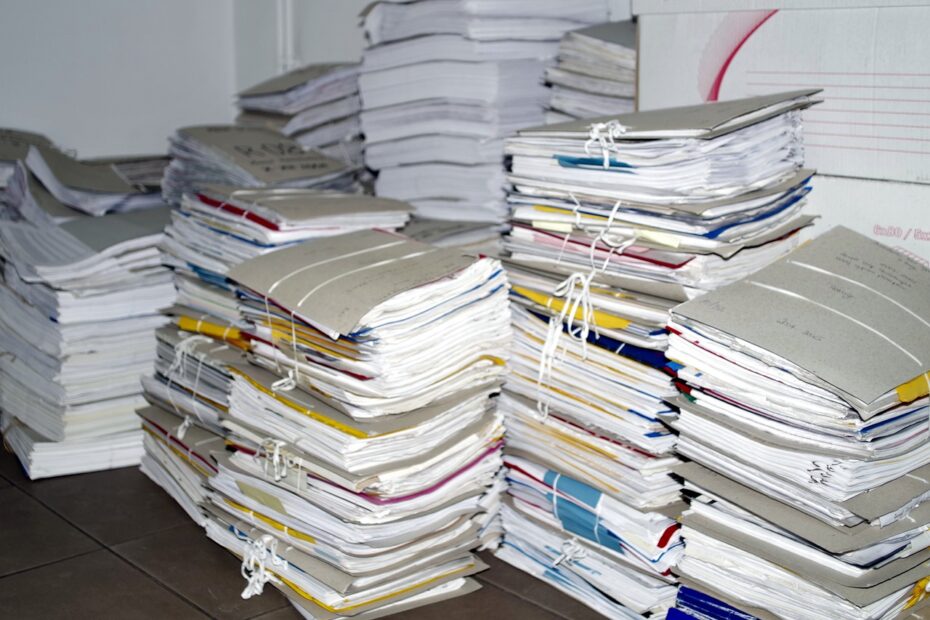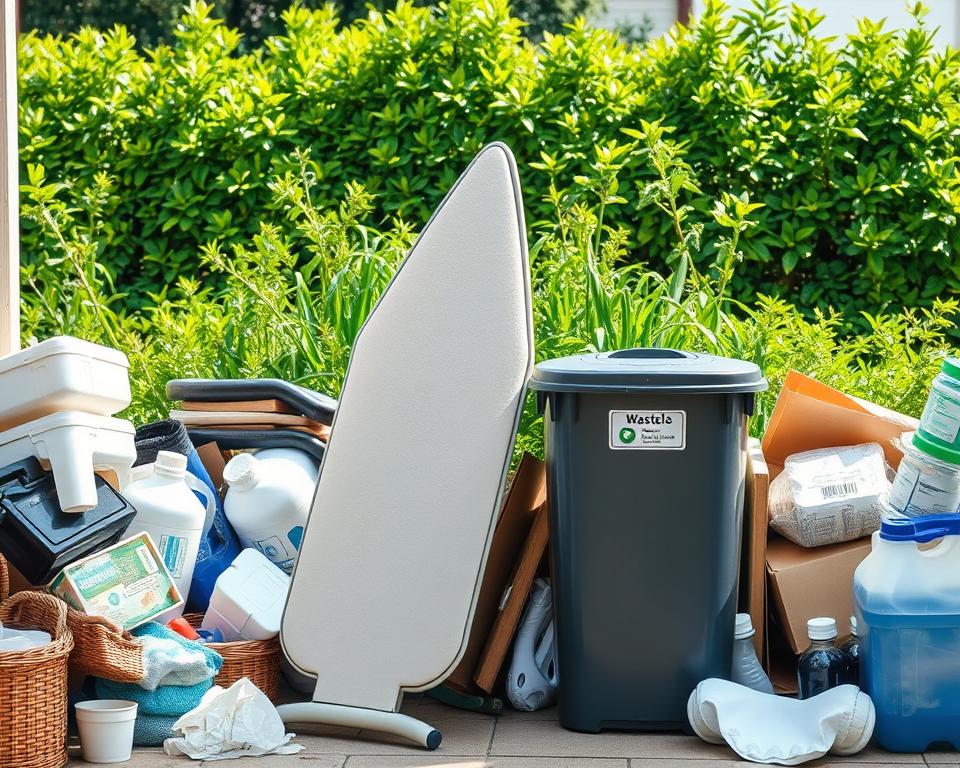Did you know shredding sensitive documents can prevent up to 90% of identity theft cases? Keeping financial papers at home can be risky. It’s important to have a plan for getting rid of these documents safely.
From account statements to tax records, we need to dispose of them right. If we don’t, it could lead to identity theft and other big problems. This article will show you how to safely get rid of your financial papers.
Key Takeaways
- Shredding sensitive documents can prevent identity theft and protect financial information.
- Shredded paper can be recycled, reducing environmental impact.
- The Federal Trade Commission recommends shredding all documents with sensitive information.
- Cross-cut shredding provides the highest level of security for personal and business documents.
- Implementing a consistent shredding routine can help avoid a buildup of sensitive information.
Importance of Proper Document Disposal
Not disposing of account statements and financial documents properly can lead to identity theft. These documents have personal and financial info like names, addresses, and Social Security numbers. If someone gets their hands on this info, they can open new accounts or file fake tax returns in your name. It’s key to shred and dispose of these items to keep your identity and financial well-being safe.
Identity Theft Risks of Improper Disposal
Identity theft is a big problem, and not disposing of documents right can make it worse. If personal and financial data aren’t destroyed right, thieves can get them. They can then use this info to commit fraud and steal your identity. This can cause big financial losses, hurt your credit, and make fixing your identity a long and hard process.
To prevent identity fraud and keep your financial data safe, you need to dispose of sensitive documents securely. This means shredding things like account statements, credit card offers, and medical records. By doing this, you can lower the risk of identity theft and protect your personal and financial health.
Proper document disposal is not just about keeping yourself safe; it’s also about following the law. Many fields have rules about how to handle sensitive documents, like HIPAA and FACTA. Breaking these rules can lead to fines, lawsuits, and harm to a business’s or person’s reputation.
Dispose of Account Statement and Other Documents to Shred
Shredding account statements and other financial documents is key to keeping your info safe. Use a cross-cut or micro-cut shredder to destroy any personal or sensitive data. This way, your documents are completely shredded and can’t be put back together.
Identity thefts and data breaches are getting more common. So, it’s vital to follow document shredding requirements to protect your privacy. Many places like pharmacies and recycling centers accept documents for paper document destruction.
Don’t forget to shred travel itineraries and boarding passes. They might have personal info in QR codes. Also, securely get rid of resumes, CVs, and other documents with personal data to avoid identity theft.
- Shred all bank statements and canceled checks, even if the account is closed
- Dispose of expired debit or credit cards immediately
- Shred balance transfer and cash advance checks
- Securely destroy all expired or outdated government paperwork and IDs
By shredding your documents properly, you protect your sensitive information. This helps lower the risk of identity theft.
Retention Periods for Financial Records
Not all financial documents need to be kept forever. The IRS usually has three years to audit tax returns. But, they can go back six or seven years in some cases. So, it’s best to keep your tax returns and supporting documents for at least seven years.
Documents to Keep for 7 Years or Longer
Here are the key financial documents to keep for at least seven years:
- Tax returns and W-2 forms
- 1099 forms and other tax-related documents
- Receipts for deductible expenses
- Records of property-related transactions
- Financial records related to federal grants or sponsored programs
- Business transaction records for certain departments
- Individual employee HR and payroll records
- Taxable income documents
The time you need to keep financial records can change. It depends on your industry, organization, or local laws. Also, don’t throw away records too soon. They might be needed for insurance claims or creditor requests.
Knowing how long to keep your financial documents is important. It helps you follow IRS and other rules. This protects your business and makes it easier to find important information when you need it.
Documents to Keep for 1 Year
Some financial records need to be kept for only a year. This includes monthly bank and credit card statements, pay stubs, and receipts for large purchases. These short-term document retention items are useful for financial statement storage and income verification documents.
Monthly bank and credit card statements are crucial for the past year. They help verify transactions and payments. Pay stubs should be kept for at least 1 year to ensure your W-2 tax forms are accurate. Receipts for big buys, like a new appliance or car, should be saved for about a year. This is for warranty claims or to prove the purchase price for taxes.
After 1 year, most of these documents can be shredded safely. Make sure to dispose of them properly to protect your personal info and prevent identity theft. A reliable cross-cut shredder is a smart investment. It ensures your financial statement storage and income verification documents are securely destroyed.
Permanent Storage for Vital Records
Managing important documents is crucial. Some records, like birth certificates and Social Security cards, should be kept forever. These vital records prove who you are and what you own. Keeping them safe is key.
These important document safekeeping items need a secure place. A fireproof safe or a safe deposit box is perfect. They keep your records safe for a long time. Learn more about safe record storage here.
| Record Type | Recommended Retention Period |
|---|---|
| Birth Certificates | Permanent |
| Social Security Cards | Permanent |
| Marriage Certificates | Permanent |
| Wills | Permanent |
| Legal Documents | Permanent |
Having a safe place for your vital records is vital. It keeps them safe from theft and damage. Proper permanent document storage and vital records preservation are musts.
Secure Storage Options for Documents
Paper Document Storage
Keeping important papers safe is crucial. You should store documents like account statements and legal contracts well. Use a filing cabinet or banker’s boxes to organize them.
For extra security, consider a fireproof and waterproof home safe. Or, rent a safe deposit box at a bank.
The right storage depends on the document’s sensitivity and how long you need to keep it. The IRS says to keep tax documents for three to seven years. Legal or medical records might need to be kept forever.
Labeling and organizing your files well helps you find what you need fast.
| Document Type | Recommended Storage Duration |
|---|---|
| Tax Records | 3-7 years |
| Medical Records | Indefinite |
| Legal Documents | Indefinite |
| Financial Statements | 1-7 years |
Secure physical storage is key for document storage methods and paper document organization. By using secure document filing practices, you protect your sensitive info and follow the law.
Digital Storage Solutions
The digital world is changing fast, making secure digital storage more important than ever. Paperless systems are becoming common, making electronic document management a smart choice. You can use external hard drives, USB flash drives, or cloud services like Dropbox, Google Drive, and Microsoft OneDrive to keep your digital files safe.
Digital storage helps clear up space and lets you access your files anytime, anywhere. It’s a great way to keep your documents organized and safe from damage or loss. Cloud-based digital document storage solutions protect your financial records, like bank statements and tax documents, so they’re always there when you need them.
Choosing the right electronic document management system is key. Look for strong security features in cloud services like Google Drive and Microsoft OneDrive. These cloud-based document storage options are reliable for managing your digital files, reducing the risks of physical storage and disposal.
| Digital Storage Platform | Free Storage Capacity | Key Features |
|---|---|---|
| Dropbox | 2 GB | Secure file sharing, mobile app, integrations with various apps |
| Google Drive | 15 GB | Seamless integration with Google suite, real-time collaboration, mobile app |
| Microsoft OneDrive | 5 GB | Tight integration with Microsoft Office, file versioning, mobile app |
| iCloud | 5 GB | Syncs with Apple devices, photo storage, secure document storage |
Exploring these digital storage options is a smart move to protect your financial and personal documents. It ensures your sensitive information stays safe and accessible.
Shredding Methods for Disposal
Secure shredding is key for disposing of account statements and other sensitive financial documents. Home shredders work well, but document shredding services add an extra security layer. They ensure your papers are destroyed completely.
Companies like Iron Mountain offer on-site shredding and off-site shredding. On-site shredding lets you see your documents destroyed. Off-site shredding is convenient because the service provider collects and shreds your papers at their secure facility.
| Shredding Method | Level of Security | Convenience |
|---|---|---|
| Home Shredder | Medium | High |
| On-site Shredding | High | Medium |
| Off-site Shredding | High | High |
Choosing the right secure paper shredding method is crucial. It protects against identity theft and misuse of your sensitive info. A trusted professional shredding provider ensures your financial records are handled with care and security.
Staying Proactive to Dispose of Account Statement
It’s important to regularly get rid of account statements and financial documents. This helps protect your personal info. By being proactive with proactive document disposal, you can lower the chance of identity theft and fraud.
To manage your financial records well, try these tips:
- Make time each year or quarter to check your records and see what can be shredded.
- Dispose of sensitive stuff properly with ongoing document shredding. Use a cross-cut shredder or a professional service.
- Have a routine to regularly review and get rid of old financial documents. This includes bank statements, credit card bills, and investment reports.
Being proactive with proactive document disposal helps you stay safe. Remember, being careful and consistent is crucial for financial record management and ongoing document shredding.
Conclusion
In today’s digital world, it’s crucial to handle your account statements and financial documents carefully. Not doing so can lead to identity theft and other big problems. By knowing the summary of key points, the importance of secure document disposal, and the financial data protection best practices, you can keep your personal and financial info safe.
Being careful with how you dispose of documents is key to protecting your identity and money. It’s about knowing how long to keep things, finding safe places to store them, and using good shredding methods. Taking these steps helps keep your financial health strong and prevents identity theft or fraud.
As you deal with personal finance, remember that safe document disposal is vital. By following these best practices, you can be sure your personal and financial info is protected. This lets you focus on reaching your financial goals with confidence and peace of mind.
FAQ
Why is it important to properly dispose of account statements and other financial documents?
Not shredding your financial documents can lead to identity theft. These papers have personal and financial info that fraudsters can misuse. It’s crucial to keep this info safe.
What is the best way to dispose of account statements and other financial documents?
Shredding them with a cross-cut or micro-cut shredder is best. This method ensures the info is destroyed and can’t be reassembled.
How long should I keep my tax returns and other financial records?
The IRS can audit tax returns for up to six or seven years. It’s wise to keep these records for at least seven years.
What financial documents should I keep for at least one year?
Keep bank and credit card statements, pay stubs, and receipts for a year. They help with taxes and prove income or expenses.
What are some important vital records that should be kept indefinitely?
Keep birth certificates, Social Security cards, marriage certificates, wills, and legal documents forever. Store them safely, like in a fireproof safe or safe deposit box.
What are some secure storage options for physical financial documents?
Use filing cabinets or banker’s boxes for documents. Consider a fireproof safe or a safe deposit box for extra security.
What are some secure digital storage solutions for financial documents?
External hard drives, USB drives, and cloud services like Dropbox are good. They keep your records safe and organized.
What are some professional shredding services that can help me dispose of my financial documents?
Companies like Iron Mountain offer shredding services. They ensure your documents are destroyed securely, more than a home shredder.
How often should I review and dispose of my financial documents?
Review your documents yearly or quarterly. Shred what’s safe to do so. This keeps your info secure and reduces fraud risk.
Source Links
- https://www.trueshred.com/blog/throw-away-old-bank-statements/
- https://www.docuclipper.com/blog/how-long-to-keep-bank-statements/
- https://securityshredding.net/destroying-your-legal-documents-why-proper-disposal-is-crucial/



